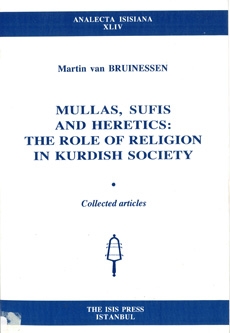Table of Contents
The religious mosaic
1. "Religion in Kurdistan",
Kurdish Times (Brooklyn, New York), vol. 4 nos. 1-2, 1991, 5-27 / 13
2. "The Kurds and Islam",
This chapter grew out of lectures I gave in Paris and Tokyo in the course of 1998. The present version was published as Working Paper No. 13, Islamic Area Studies Project, Tokyo, Japan, 1999. Another version appeared as the introduction to a special issue (titled "Islam des Kurdes") of the journal Les Annales de I'Autre Islam (No. 5, Paris, 1998) that I edited with Joyce Blau / 37
3. "The Christians of Eastern Turkey, the state and the local power structure"
This paper was originally written as an expert's report submitted to the Netherlands Council of State when this was reviewing the trial of a group of Syrian Orthodox asylum seekers, October 8, 1978. It was published in ICMC Migration News no. 3-4(1979), 40-46 / 59
Learning and mysticism in the seventeenth to nineteenth centuries
4. "Religious life in Diyarbekir: religious learning and the role of the tariqats",
Originally a section of the introduction to: Martin van Bruinessen and Hendrik Boeschoten, Evliya Çelebi in Diyarbekir, Leiden: E. J. Brill, 1988, pp. 45-52. I have made some additions to the original text to allow it to stand by itself / 69
5. "The Naqshbandi order in 17th-century Kurdistan",
First published in: Marc Gaborieau, Alexandre Popovic et Thierry Zarcone (ed), Naqshbandis: cheminements et situation actuelle d'un ordre mystique musulman. Istanbul-Paris: Editions Isis, 1990, 337-360 / 87
6. "The impact of Kurdish ‘ulama on Indonesian Islam",
A revised version of "Kurdish ‘ulama and their Indonesian students", in: De Turcicis aliisque rebus commentarii Henry Hofman dedicati [= Utrecht Turcological Series, vol. 3]. Utrecht: Instituut voor Oosterse Talen en Culturen, 1992, pp. 205-227. The present version was also published in Les Annales de VAutre Islam 5 (1998), 83-106 / 111
7. "A nineteenth century Kurdish scholar in South Africa",
Revised version, with additional information, of a brief notice that was originally published as the final section of "Kurdish ‘ulama and their Indonesian students" and that was left out in the later version of that paper / 133
The social and political roles of sufi orders in Kurdistan
8. "Popular Islam, Kurdish nationalism and rural revolt: The rebellion of Shaikh Said in Turkey (1925)", First published in: Janos M. Bak and Gerhard Benecke (eds.), Religion and Rural Revolt. Manchester: Manchester University Press, 1984, pp. 281-295 / 143
9. "Vom Osmanismus zum Separatismus: Religiose und ethnische Hintergriinde der Rebellion des Scheich Said", First published in: Jochen Blaschke & Martin van Bruinessen (Hrsg), Islam und Politik in der Tiirkei. Berlin: EXpress Edition, 1985 (Reprinted: Berlin: Parabolis, 1989), pp. 109- 165 / 159
10. "The Sadate Nehri or Gilanizade of Central Kurdistan",
Appeared in Journal for the History of Sufism 1 (1999) / 199
11. "The Qadiriyya and the lineages of Qadiri shaykhs in Kurdistan",
Appeared in Journal for the History of Sufism 1 (1999) / 213
12. "Sûfîs and sultans in Southeast Asia and Kurdistan: a comparative survey",
First published in Studia Islamika (Jakarta), vol. 3, no.3 (1996), 1-20 / 231
Heterodox religious formations in Kurdistan
13. "When Haji Bektash still bore the name of Sultan Sahak. Notes on the Ahl-i Haqq of the Guran district", First published in: Alexandre Popovic & Gilles Veinstein (eds), Bektachiyya: etudes sur 1'ordre mystique des Bektachis et les groupes relevant de Hadji Bektach. Istanbul: Editions Isis, 1995, pp. 117-138 /245
14. "Haji Bektash, Sultan Sahak, Shah Mina Sahib and various avatars of a running wall",
Revised version of an article that first appeared in Turcica XXI- XXIII, 1991,55-69 / 271
15. "The Shabak, a Kizilbash community in Iraqi Kurdistan",
Les Annales de I'Autre Islam 5 (1998), 185-196 / 295
16. General Bibliography / 305
|
